#god: a human history
Explore tagged Tumblr posts
Text

to be understood!
#redraw#garabatos#the owl house#toh#luz noceda#artists on tumblr#top lines in human history ever i swear to god shes just like kid me fr#one of my favorite things from last year i made#eyestrain
12K notes
·
View notes
Text
In addition to my Monkey Man post from earlier, the always kind & sweet Aparna Verma (author of The Phoenix King, check it out) asked that I do a thread on Hijras, & more of the history around them, South Asia, mythology (because that's my thing), & the positive inclusion of them in Monkey Man which I brought up in my gushing review.
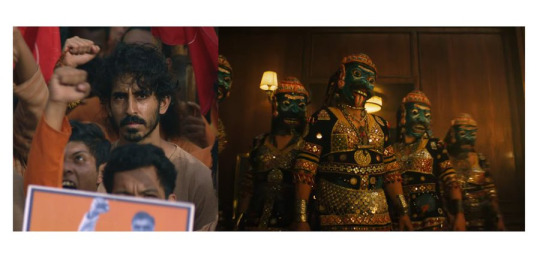
Hijra: They are the transgender, eunuch, or intersex people in India who are officially recognized as the third sex throughout most countries in the Indian subcontinent. The trans community and history in India goes back a long way as being documented and officially recognized - far back as 12th century under the Delhi Sultanate in government records, and further back in our stories in Hinduism. The word itself is a Hindi word that's been roughly translated into English as "eunuch" commonly but it's not exactly accurate.
Hijras have been considered the third sex back in our ancient stories, and by 2014 got official recognition to identify as the third gender (neither male or female) legally. Pakistan, Nepal, Bangladesh, and India have accepted: eunuch, trans, intersex people & granted them the proper identification options on passports and other government official documents.
But let's get into some of the history surrounding the Hijra community (which for the longest time has been nomadic, and a part of India's long, rich, and sometimes, sadly, troubled history of nomadic tribes/people who have suffered a lot over the ages. Hijras and intersex people are mentioned as far back as in the Kama Sutra, as well as in the early writings of Manu Smriti in the 1st century CE (Common Era), specifically said that a third sex can exist if possessing equal male and female seed.
This concept of balancing male/female energies, seed, and halves is seen in two places in South Asian mythos/culture and connected to the Hijra history.
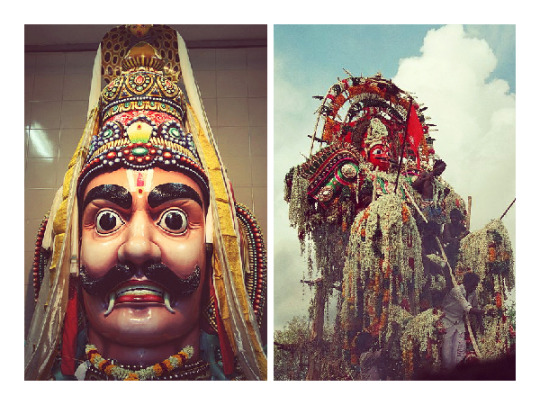
First, we have Aravan/Iravan (romanized) - who is also the patron deity of the transgender community. He is most commonly seen as a minor/village deity and is depicted in the Indian epic Mahabharata. Aravan is portrayed as having a heroic in the story and his self-sacrifice to the goddess Kali earns him a boon.
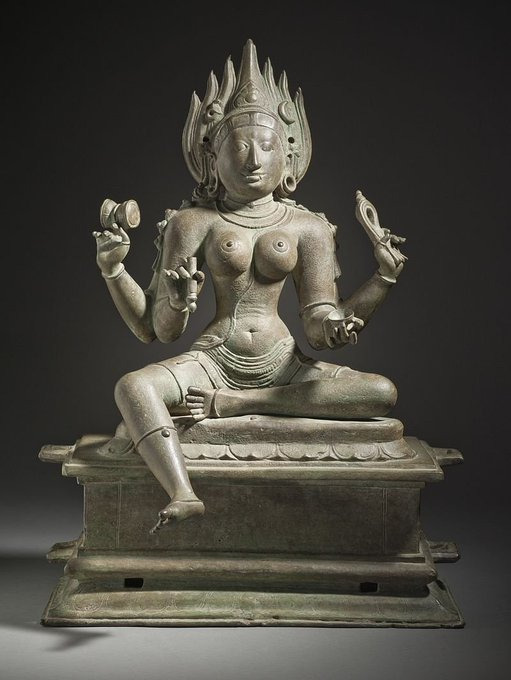
He requests to be married before his death. But because he is doomed to die so shortly after marriage, no one wants to marry him.
No one except Krishna, who adopts his female form Mohini (one of the legendary temptresses in mythology I've written about before) and marries him. It is through this union of male, and male presenting as female in the female form of Mohini that the seed of the Hijras is said to begun, and why the transgender community often worships Aravan and, another name for the community is Aravani - of/from Aravan.
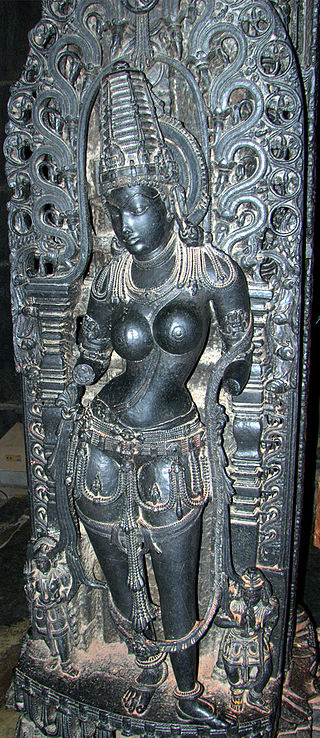
But that's not the only place where a gender non conforming divine representation can be seen. Ardhanarishvara is the half female form of lord Shiva, the destroyer god.
Shiva combines with his consort Parvarti and creates a form that represents the balancing/union between male/female energies and physically as a perfectly split down the middle half-male half-female being. This duality in nature has long been part of South Asian culture, spiritual and philosophical beliefs, and it must be noted the sexuality/gender has often been displayed as fluid in South Asian epics and the stories. It's nothing new.

Many celestial or cosmic level beings have expressed this, and defied modern western limiting beliefs on the ideas of these themes/possibilities/forms of existence.
Ardhanarishvara signifies "totality that lies beyond duality", "bi-unity of male and female in God" and "the bisexuality and therefore the non-duality" of the Supreme Being.
Back to the Hijra community.
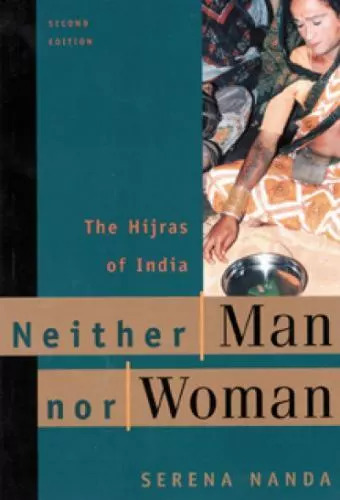
They have a complex and long history. Throughout time, and as commented on in the movie, Monkey Man, the Hijra community has faced ostracization, but also been incorporated into mainstream society there. During the time of the Dehli Sultanate and then later the Mughal Empire, Hijras actually served in the military and as military commanders in some records, they were also servants for wealthy households, manual laborers, political guardians, and it was seen as wise to put women under the protection of Hijras -- they often specifically served as the bodyguards and overseers of harems. A princess might be appointed a Hijra warrior to guard her.
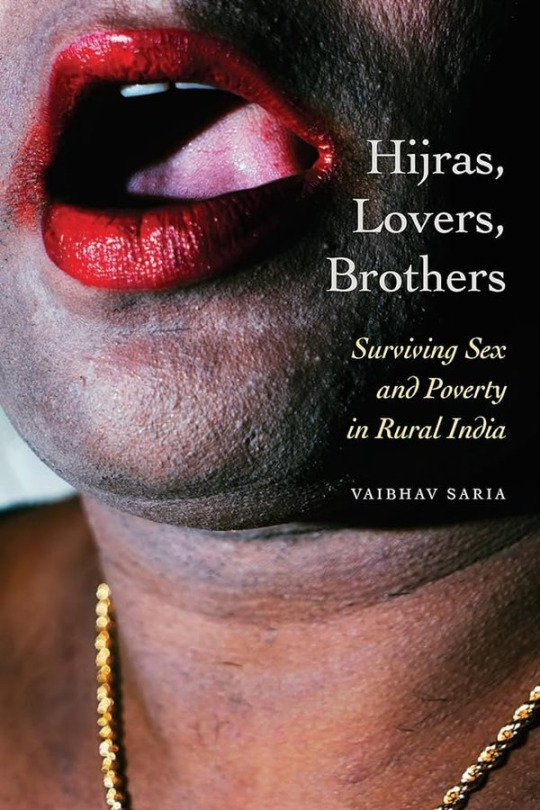
But by the time of British colonialism, anti-Hijra laws began to come in place folded into laws against the many nomadic tribes of India (also shown in part in Monkey Man with Kid (portrayed by Dev Patel) and his family, who are possibly
one of those nomadic tribes that participated in early theater - sadly by caste often treated horribly and relegated to only the performing arts to make money (this is a guess based on the village play they were performing as no other details were given about his family).
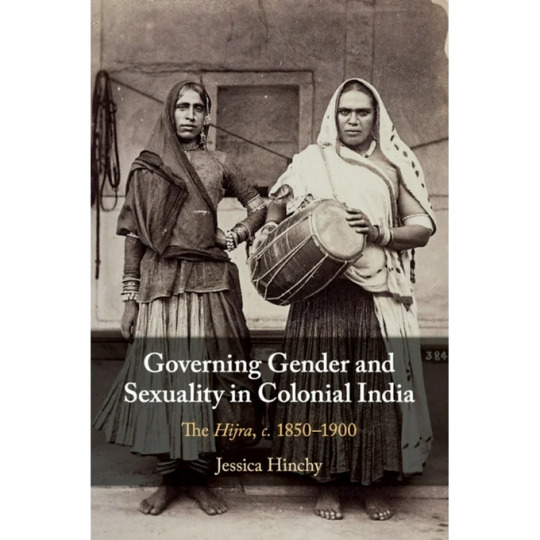
Hijras were criminalized in 1861 by the Indian Penal Code enforced by the British and were labeled specifically as "The Hijra Problem" -- leading to an anti-Hijra campaign across the subcontinent with following laws being enacted: punishing the practices of the Hijra community, and outlawing castration (something many Hijra did to themselves). Though, it should be noted many of the laws were rarely enforced by local Indian officials/officers. But, the British made a point to further the laws against them by later adding the Criminal Tribes Act in 1871, which targeted the Hijra community along with the other nomadic Indian tribes - it subjected them to registration, tracking/monitoring, stripping them of children, and their ability to sequester themselves in their nomadic lifestyle away from the British Colonial Rule.
Today, things have changed and Hijras are being seen once again in a more positive light (though not always and this is something Monkey Man balances by what's happened to the community in a few scenes, and the heroic return/scene with Dev and his warriors). All-hijra communities exist and sort of mirror the western concept of "found families" where they are safe haven/welcoming place trans folks and those identifying as intersex.
These communities also have their own secret language known as Hijra Farsi, which is loosely based on Hindi, but consists of a unique vocabulary of at least 1,000 words.
As noted above, in 2014, the trans community received more legal rights.
Specifically: In April 2014, Justice K. S. Radhakrishnan declared transgender to be the third gender in Indian law in National Legal Services Authority v. Union of India.
Hijras, Eunuchs, apart from binary gender, be treated as "third gender" for the purpose of safeguarding their rights under Part III of our Constitution and the laws made by the Parliament and the State Legislature. Transgender persons' right to decide their self-identified gender is also upheld and the Centre and State Governments are directed to grant legal recognition of their gender identity such as male, female or as third gender.
I've included some screenshots of (some, not all, and certainly not the only/definitive reads) books people can check out about SOME of the history. Not all again. This goes back ages and even our celestial beings/creatures have/do display gender non conforming ways.
There are also films that touch on Hijra history and life. But in regards to Monkey Man, which is what started this thread particularly and being asked to comment - it is a film that positively portrayed India's third sex and normalized it in its depiction. Kid the protagonist encounters a found family of Hijras at one point in the story (no spoilers for plot) and his interactions/acceptance, living with them is just normal. There's no explaining, justifying, anything to/for the audience. It simply is. And, it's a beautiful arc of the story of Kid finding himself in their care/company.
#hijra#trans representation#monkey man#dev patel#transgender#trans rights#trans rights are human rights#third sex#indian history#indian culture#colonialism#imperialism#south Asian mythos#South Asian myths#Aravan#Iravan#Mahabharata#hindu mythology#hindu gods#kali goddess#krishna#hindu mythology art#Ardhanarishvara#Shiva#Parvarti#sexuality#gender fluid#fluid sexuality#trans community#transgender rights
835 notes
·
View notes
Text
reading a book rn called "the other olympians" and lemme tell you, i knew that women's sport was segregated because of misogyny and i knew there was always a fear of women being "too masculine" by participating in sports and that this was wrapped up in intersexism and racism but. the extent. to which this was embedded from the olympics earliest days (that is, utterly and completely).
trust that the issue has never been and never will be a trans woman who's good at swimming, or shotput, or running, or anything else, she's a handy dandy scapegoat. it's always been about diminishing women's capabilities and access by denying women who are too good at sport the right to be a woman in the first place. because a woman who is too good at anything has lost the right to be a woman. and by that i mean she's lost the right to be a human being.
#which is ofc what happens to trans women and intersex women and women of colour. god forbid you're all three#and im still getting to the part about trans men (some of whom may also have been intersex)#at the end of the day it's a declaration of who is and who isn't allowed to participate in humanity#and the olympics has had a big hand in that since the beginning of the 20th century#1920s shaping our current day politics about gender once again? shocking#anyway one of the wackier ideas was that women doing too much sport would literally spontaneously change sex#the book didn't say what the counterpart of that might be... needlepoint causing an influx of estrogen? who knows#the other olympians#history#queer history#trans history#intersex history#womens history#the first women to be speculated about were intersex women women of colour and trans men.#i wonder if this will write about dora ratjen as well tho#it's building to the berlin olympics in 36 so probably
107 notes
·
View notes
Text

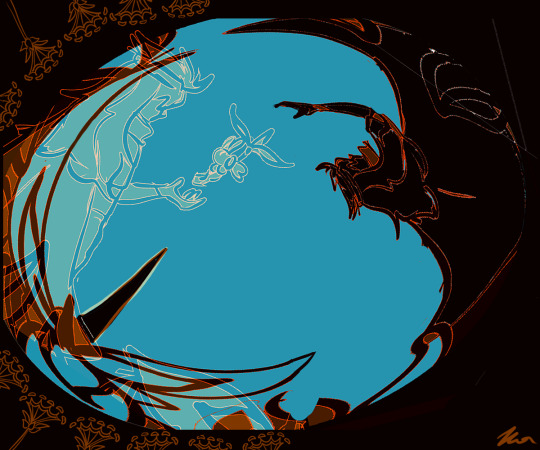
No matter where I go, my aging heart always leads back to you.
#az pokemon#pokemon az#trainer az#eternal flower floette#az floette#pokemon xy#pokemon x and y#kalos#pokemon fanart#my art#havent drawn az in a while so...#Kalos#the heart remembers#i made the ult. weapon a crown because that became a symbol of az's legacy in tune with his ascension to “godhood” at the time.#the sins associated with it preoccupies his head for a longggg time...further joined with the chained key....#it's also interesting because in JAP they called him a god (goes beyond the statement of kings as symbolically appointed by divinity)#bc of that i see him as being a god-king for whatever periods of time (who knows how soon he disappeared afterwards...)#I discussed this with a mutual#on how he isnt exactly...human in an average sense give. his unnatural longevity and height.#yet despite that he's still one. That does not make him any less of a human being. Over the years he is reduced from#king to a jaded vagrant whose scant will clings onto the modicum of stubborn hope for finding floette who was his entire world#The last piece is partly inspired by Minoan art…my class on Aegean history has been really interesting
93 notes
·
View notes
Text
The characters in veilguard make Such a big deal out of Thee Elven Gods being real and evil when like. Idk I always got the vibe that the average human wouldn’t be able to name any of the elven gods except for maybe Mythal. The city elves don’t even know much about the Dalish and that’s like. By human design. The Dalish are a persecuted and oppressed religions minority and I feel like this is just another way the game glosses over “political lore”. The average reaction to the news wouldn’t be deep existential dread it would be “wtf is a ghilan’nain?”
#the game treats the Dalish gods as if they’re well known and they just Aren’t. because Dalish history has been systematically erased#the average ferelden human farmer probably doesn’t even know that the Dalish have gods#or if they do know it’s only because the chantry paints them as makerless heathens#they could’ve done something where the threat the gods pose is vastly underestimated#because the greater population refuses to accept any god but the maker.#obviously these false gods don’t pose a threat. because there are no other gods#it could’ve been like the “’mage vs god’ debate you have at the lighthouse but like. politically significant and on a larger scale#da#veilguard critical
103 notes
·
View notes
Text
It is immensely difficult to understand just how completely white Southerners wrote off slaves in their political calculations. How, we ask, could they contemplate war without worrying about the possibilities it opened up to four million enslaved people? But so irrelevant were slaves to their thinking that William Yancey, the influential Alabama fire-eater, could recommend secession as a resolution of all the old struggles. It would augur, he said, a future with "no irrepressible conflict and no domestic enemy to incite our vigilance." Black Republicans--that is to say, white Northern men and not slaves--were the domestic enemy Yancey had in mind.
Southerners of all political persuasions worried publicly and to good effect about the way abolitionists incited slaves to violence. One can readily discern the heavy weight of racial thinking about people of African descent. It was hard for white Southerners to think of slaves as "the enemy within." More than thirty years of proslavery training had mostly dissuaded them from that view. But the fear lurked just below the surface, and a benevolent paternalism always confronted a deeper antagonistic view. One can hear their conflicting emotions when white Southerners learned of John Brown's attempt to raise slave support in his raid on Harper's Ferry. One contributor to the Charleston Mercury opened with a brave denial that planters had anything to worry about at all--"they would as soon suspect their children of conspiring against their lives"--but descended quickly into a tortured consideration of circumstances in which slaves might indeed pose a threat. When "constantly tampered with," the writer fretted, faith in the Africans' good nature could prove a flimsy defense. "Our negroes are constantly tempted to cut our throats or pink us" with rifles. It was well to be prepared for the worst. Those "foot peddlers" from New York trolling the neighborhoods could "put the devil in the negros' heads," and could have been down there already "for all we know, arming the troops." The conflicted view of slaves' nature was palpable but controlled. Slaves were said to be, by nature, good, childlike, and loyal servants to their masters; they posed a danger only when white outsiders attempted to "rouse an ignorant people [by appealing] to their superstition and lust." Thus when secession dispensed with the Black Republicans, as Yancey promised, slaves would no longer represent a force of any sort.
[...]
African slaves in New World societies underwent a process of instrumentalization rather than simple suppression or exclusion. White Southerners were so deeply implicated in that process that they had great difficulty shaking an instrumentalist view of African American people even when confronted with evidence to the contrary. Rare, indeed, was the commonsense observation like that of Waltman Willey, a western Virginia Unionist, who, disparaging the secessionists' argument that slavery would be safer out of the Union, asked bluntly what the consequences of destroying the Union would be: "What then. The common national obligation [to return fugitive slaves] is destroyed. Will not the negro find out? The motives to flee across the line would be increased, because he would know that whenever he crosses that line he will be free." What Willey predicted was precisely what most white Southerners denied: that slaves had motives and interests entirely their own, channels of communication that kept them apprised of relevant developments, and allies whose help they knew to seek. It would take Confederates a long time to learn those lessons.
stephanie mccurry, confederate reckoning: power and politics in the civil war south
#the thing is that people dehumanize other to the point of complete delusion so often throughout human history without interruption#and i just.... find it so so so so satisfying..... to spend time contemplating a time it turned out to fucking bite them in the ass#they really convinced themselves they were god kings of the world. and the world proved them wrong.#you just almost never get to see that. you almost never get to see this kind of shit and know#that there came a point where these losers had to confront how wildly wrong they had been.#confederate reckoning#bookblogging#media 2k24
79 notes
·
View notes
Text
I’m sorry, but can you just imagine:
Elves in Valinor: i wonder how the elves that choose to remain in ME are doing? Are they suffering? Are they thriving? Have they faded yet?
Meanwhile, Thranduil: *sipping a pina colada out of a coconut, hanging out in a hammock, on a beach, with some reggae and a nice book* i don’t care that staying in ME means that i will face hardships and horrors that are beyond valinor’s wildest dreams, because i’m sure i’m also relaxing and living the good life beyond valinor’s wildest dreams.
#i’m sorry#but you can’t tell me that valinor has progressed as fast as the humans in ME have#ME elves might hve faced the horrors of our history but they are also reaping the benefits#sure they’re worried about everything but by god are they gonna take what they can get#lord of the rings#lotr#lotr elves#the hobbit#silmarillion#thranduil#incorrect tolkien quotes#incorrect lotr quotes#incorrect hobbit quotes
235 notes
·
View notes
Text
fangirl culture is and always has been so important in preserving the often untold history of musical (and other) legends. they are the ones who look into the true stories of popular culture and see beyond shallow, consumable media stories. people misunderstand their nuanced and emotionally attuned understanding of celebrities as “craziness,” but it is the same as men preserving the accounts of their “idols” through masculine idealism that overlooks the social constructs and complexities that may have subtly swayed the lives of their “heroes.”
#like how (male) historians will say “Lennon or McCartney as if they are some stoic melodic gods#meanwhile fan girls will use humor and empathy to acknowledge their idol’s good and bad qualities#get heteronormativity out of history too!#misandry#classic rock#the beatles#john lennon#paul mccartney#george harrison#ringo starr#60s music#70s music#music history#counterculture#history#humanize celebrities!
37 notes
·
View notes
Text
Who is Jesus Christ?
14. MAN OF SORROWS

Today is Good Friday and it’s good to remember the purpose for Jesus’ crucifixion.
Sorrow became characteristic of Jesus’ life because He suffered for the sins of humans.
The Bible says that “Without the shedding of blood, there is no forgiveness of sins”— Hebrews 9:22
Today marks the day that the blood of Jesus was shed to save humans from their sin. Jesus was crucified and died so that you can have spiritual and eternal life.
Jesus saved you from spiritual and eternal death, by dying for your sake.
Romans 3:25 “For God presented Jesus as the sacrifice for sin. People are made right with God when they believe that Jesus sacrificed His life, shedding His blood. This sacrifice shows that God was being fair when He held back and did not punish those who sinned in times past,”
Those who believe that Jesus sacrificed His life for their sin will be made right with God.
Choose to be made right with God today by believing that Jesus sacrificed His life for you.
Say this prayer:
“Dear Lord Jesus, I know I am a sinner and ask for Your forgiveness. I believe You died for my sins and rose from the dead. I turn from my sins and invite You into my heart and life.”
Now, join a sound, Bible-believing and practising church. Continue to study Jesus’ words and live as He wants His followers to live.
Be cleansed and set free by the blood of Jesus.
#bible#bible verse#christian broadcasting network#christianity#jesus#human beings#humanity#jesus christ#hope#who is jesus#hopeinchrist#hope in god#the blood of Jesus#blood of jesus#christian bible#christian blog#christian faith#christian living#salvation#saviour#forgiveness#good friday#crucifixion#cross of christ#sacrifice#history#jesussaves#faith in jesus#faith
40 notes
·
View notes
Text
I don't know what I love more, the fact that as rook you can make a statement in NO uncertain terms that you are NOT responsible one way or the other for the theological implications of the shit you're discovering in the 'regrets of the dread wolf' memories. not my jurisdiction. quite simply none of my business. not my chantry circus not my chantry monkeys. irrelevant to the matter at hand here we'll kill that god if we get to him he can get in line. or if the best thing about it is seeing the lone little 'lucanis approves' that pops up right after choosing it. corvid with a knife about to commit deicide keeping it real and sensibly, pragmatically, wilfully agnostic with me here in this magical lighthouse today
#we do not see it. we cannot read all of a sudden.#rye having war flashbacks to watcher conferences and firmly going 'we are *not* getting derailed by the metaphysics here folks'#rare stern moderator/dad hat moment from ingellvar lol. he's Seen Some Shit in his time (debates that raged over the multiple#and not always concurrent life times of the participants involved. ain't no academic rivalry like watcher academic rivalry#because watcher academic rivalry doesn't stop even when everyone involved is dead. and the rest of us have to live with it)#I. do not think the way I'm getting this quest is how it's meant to be experienced so I'm a bit at a loss as to how to pace it out#I've been an annoying little completionist so I have ALL the statues and could just marathon it out#but that does not feel like the best way for the story and upcoming reveals to work. hm. how to do this#I'm supposed to go fail to save weisshaupt right around now I can't be having study group with all of you rn as much of a delight as it is#rye is nominally an andrastian as mainstream nevarrans generally are but as I gather is the case with many of the watchers#what he *actually* believes in is the grand necropolis itself haha#(and the philosophy of history memory death and relationship (as well as responsibility) between the past and the present#and indeed the future that it represents. we have a duty. to what has been to what is and to what will come after us. good shit)#the nevarran/mortalitasi element just makes their lack of care or respect for chantry orthodoxy *mwha* that extra bit special#the nevarran lack of concern bordering on quiet condescending disdain for official chantry doctrine and policy my beloved#dragon age#dragon age: the veilguard#dragon age: the veilguard spoilers#dragon age spoilers#poor harding really is living through the most relentless 'if this is the maker testing my faith he sure be testing me' gauntlet of all tim#good news: god might be real! bad news: god might not even be a real thing but more like a magical accident or vibration or something#honestly tho. if we could get full lovecraftian incomprehensible to human conception the maker -- He is a particle and a wave style --#that's the only way I'd be cool with him or them actually answering the question of his existence. that'd be kind of sick#'yes. but no. but maybe. depends on how you define god. and exist. and he. and does.' *ingellvar sets of the METAPHYSICS!! klaxon#that's a time out folks good game but easy on the jargon and navel-gazing definition of terms next round#rye and lucanis have some slightly differing views about at what exact stage of a problem murder becomes a valid solution#('well you just kill them and then I'm the one who has to deal with the next much longer part')#but they're surprisingly kind of vibing on a lot of other stuff lol. good for them <3#oc: Ellaryen Ingellvar
54 notes
·
View notes
Text
Wondering how Hellenic Polytheism will look in the future. Not just in a couple of decades, I mean like 10,000+ years later.
Will it still be practiced? Will humans still be Homo sapiens? What will future humans think of us? What about flora and fauna that may not exist anymore? Will they see how we practiced and find the descendants/closest relatives of today's animals? Will certain gods be more popular? Will they read the Odyssey and think about the long journey because they can just go through a tunnel and reach their destination in minutes? Will they look at maps and compare locations?
#Don't mind me#I'm taking a small course on dinosaurs and have been learning about the natural history of this world and human evolution#Probably giving myself an existential crisis too#witchblr#paganblr#witchcraft#deity work#deity worship#helpol#hellenic polytheism#hellenic pagan#hellenic paganism#hellenic gods#hellenic deities#hellenic worship
26 notes
·
View notes
Text
thinking about camazotz is a direct parallel to ritsuka in how they lived and their journey
the king of braves for whom all of humanity sacrificed themselves for. the last master of humanity who's the only hope of getting any of it back. ritsuka surrounded by friends and allies and notably speeding his ass through everything (lb1 in 2 weeks, lb3 in ONE), camazotz who spent millions of miserable torturous lonely years throwing himself at the spider again and again
ritsuka who refuses to let go of his memories and the people precious to him. camazotz who forgot every single one while desperately grabbing at them like sand that slips through his fingers
#grabs you by the neck#koyanskaya wanting to turn ritsuka into one of her tails and listing the foreign god as another desired material in the same sentence.#what is the only thing said to have given the foreign god pause? koyanskaya. beast of humanity.#camazotz is the lost beast 1 of oblivion and sacrifice and pity and salvation and *exoneration*#stares directly at ritsuka fujimaru#hey buddy. you who refuses to forget anything. you who has made countless sacrifices whether of your own or using others.#you who is stuck in a unenviable position unmoored from time#you who has saved the world once before#it is all for the sake of pan-human history.#fgo#fate
31 notes
·
View notes
Text
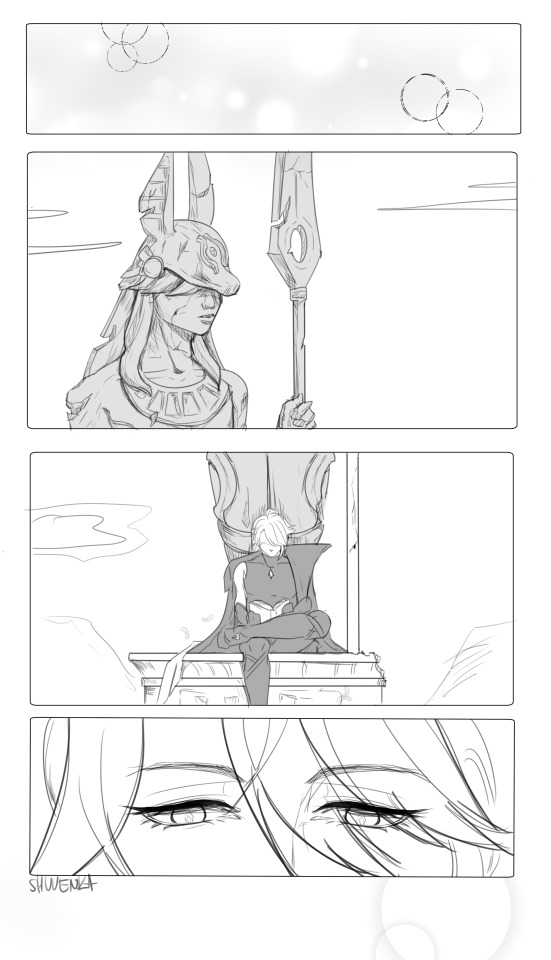
It's been awhile, couple hundred of years.
Give or take.
It's not that bad, Cyno.
Just a bit of ache. A bit of yearning.
Ah, and missing you for all of the eternal life I was cursed with.
Selfish desires of the heart that was once moved.
#haino#cytham#alhaitham x cyno#cyno#alhaitham#cyhaino#immortal alhaitam and cyno who is long gone#this is one of the au's that are rattling in my brain#alhaitham as history keeper and immortal being#never minding his immortality#just gaining knowledge and observing and noting down#until he meets cyno#cyno is a warrior#a general that is a vessel for a god#challeges him and fascinates him#and alhaitham for the first time becomes part of the history he used only to observe#because cyno fights in the war because of his loyality and conviction#suddenly theres so much meaning in small things that alhaitham never discovered before#so much meaning in life#but human life is short and ficle#and for cyno it also ends#neither peacefully nor of old age#he dies by blade and blood spilling#but he is remembered by his kin#they build him a statue#his name will be remembered in books#as for alhaitham - he will continue wandering history#missing him deeply#maybe immortality is in fact a curse
151 notes
·
View notes
Text
There's a LOT of things people do wrong when constructing fantasy beliefs in pantheons of gods, but one of the more specific is having only one god related to fertility and it kind of being just a horny sex thing.
Like you'll have one in the entire bunch whose sphere is listed as fertility and it's basically like Yeah this is the sex one. She's always depicted naked (but not TOO naked because censorship and/or the writer's own skittishness). She's going to have the exact body type epitomized in contemporary western beauty standards and there's usually no chance in hell that she's gonna be fat (unless MAYBE they're referencing 'venus' figurines). Her thing is fertility, which means having sex and making babies. Might be a goddess of beauty or love or marriage too, because these are kinda sex things, but that's probably it. And yeah that sort of thing is virtually nonexistent in real life.
Like the concept of fertility is so fundamentally important to the function of most societies in human history in ways that it is just Not in industrialized imperial core countries. Most people are getting food from stores, and not having to worry about harvesting crops or breeding livestock or foraging for food or having enough animals to hunt, so fertility only really comes up as a concern if you're trying to have kids (and there is certainly societal pressure to have children, but your wellbeing and survival is rarely going to Depend on it). And I think writing only from that perspective and not even trying to learn about WHY fertility is so conceptually important is why you see this trend.
There's no absolute universal statement about how people believe in gods but it's broadly accurate that systems with many deities will Usually have more than one deity associated with fertility, and these associations will certainly include human reproduction but also the fertility of livestock/hunted animals, plants, the land itself.
Some fertility deities may also be heavily associated with seasonal changes or environmental factors that agriculture or foraging is dependent on (spring/summer/fall, seasonal rains, seasonal flooding, rain itself, sunlight, good soil, rivers, wetlands, etc). Some certainly might be related to love, marriage, sex, and beauty, but that's VERY RARELY going to be the sole way the concept of fertility is embodied. And they'll often will have other associations not directly about fertility, or related to fertility in culturally specific ways.
#I think a lot of the time people are using Aphrodite as their sole reference for the concept of Fertility Deity (and even then#not really grasping the nuances of her depiction/worship or place in the broader ancient Greek religious worldview)#Or understanding that she isn't the Only fertility related deity (like jsut off the top of my head there's fertility associations with#Hera + Artemis + Pan + Dionysus + Demeter + Persephone + Priapus and I'm pretty sure I'm missing several here)#Just in general pantheons where there is only one god associated with any given concept are very rare (unless the concept is very specific)#Like a pantheon with dozens of gods will probably have more than one solar deity but might have only one that presides specifically#over a certain crop or something#Also in a wide reaching/long-spanning religion associations might change with time or as a result of religious syncretism#Or gods may be worshipped under specific and/or localized epithets which describe the god specifically as it presides over this#location or the god as it relates to specific parts of its nature.#It might be a little different if you're writing in a context where the gods are a confirmable part of material reality but even then like#unless your gods are extremely active in managing how they're worshipped culture is going to shape their perception.#Also as a side note if you are completely within your power to depict what you want you should probably be okay with depicting#nudity. Like there's always cultural variations in what/how much/under which circumstances nudity is acceptable (and many cases#where personal nudity is not okay but depictions in art are). But the outright refusal to show a Bare Tit or Flaccid Penis even in art is#virtually nonexistent throughout the vast majority and wide span of human history and like realistically speaking there's going to be#Erect Phallus too. Phallic imagery isn't quite Ubiquitous but VERY common across human history like.. You gotta get over it
99 notes
·
View notes
Text
I never took dean's extremely antagonistic attitude towards sam drinking blood as compared to anything else really seriously. While in first seasons they were still new to weird and their reactions might have been not as desanitized as later seasons it was always kinda clear he was illogical about this. The immoralness of demon blood was a pretense at most. An excuse dean could latch onto to clad his deep-seated personal unadulterated hatred to sam seeking someone else. And also his insecurity that his place- his entire purpose is easily being replaced/filled by ruby and taken right from under his nose and he's so driven up the wall he acts unreasonably and borderline psychotic like locking sam up and emotionally manipulating him to prevent it, when that doesn't work he resorts to violence. He was rationalizing his ugly feelings of hostile defensiveness and jealousy as some kind of a higher moral endeavor, but it was painfully obvious that was not the case. Dean literally at some point implies he agrees that sam is doing good and he's willing to accept him back but ruby is a deal breaker he unintentionally makes a visible distinction between it being a corruption/-humanitydescend issue and a more gripe that demon blood is rooted in dependence on demons and/or the constant need for supply; leaving sam not entirely dependent on dean alone. (Combine this with dean's emphasis on them finally being together and for nothing to come between them in s2&1)
Sam killed demons, he could exorcise people without killing them, he could kill Lilith and prevent the apocalypse (what they believed at the time) all objectively good acts. But dean blatantly did not care. Because his issue was never in the moralness of it or ''becoming less human'' hell this guy covered up for sam in an instant when he killed a hunter without thought. He threatened anyone to not lay a finger on sam when he thought sam was 100% going to turn into a monster and start killing them all (rather wanted to stay with him). Come demon blood and he suddenly is narratively very expected to kill sam out of moral obligation? Nahh it's a very fucked up psychotic break from a possessive driven mad who used up all his cards and is not willing to hand down what he finally owed to someone else so he's going to make sure no one else can have what he doesn’t. Dean stringed bobby along with him thinking they were both doing a savior mission for sam's ultimate sake and the world's when they were both on very different pages. Heck bobby is not the only one dean had fooled it was the audience and the narrative too. Insanely ironic
#supernatural#spn meta#spn#sam winchester#dean winchester#samdean#and he has a history with pinning his personal wants wrt sam on 'the greater good' pretense rather than admit the reality#like that moment with bilie#its funny bc if the narrative is taken from deans pov then sam here was extremely villainized for savin people/trying prevent an apocalypse#but was easily let off when he does the actual worst/fucked up act when he intentionally released god's sister who nearly ended the world#just because in the latter case dean was not so angry with sam wanting to save him (dean looooves when sam is crazy abt him)#to dean it's basically like: sam purposely bringing onto the earth sth worse than an apocalypse (forgiven mistake)#sam tries to prevent an apocalypse & save humans but gets tangled up with ruby (war crime)#you dont wanna trust this man's judgment#mine
58 notes
·
View notes
Text
The Bible is both myth and history, and we do not know whether the ancient Greeks believed in the gods of Olympus or saw them merely as stories. Human beings can believe and disbelieve at the same time.
Iain Pears, from Arcadia
#human nature#faith#belief#religion#the bible#greek gods#mythology#history#social commentary#quotes#lit#words#excerpts#quote#literature#iain pears#arcadia
17 notes
·
View notes